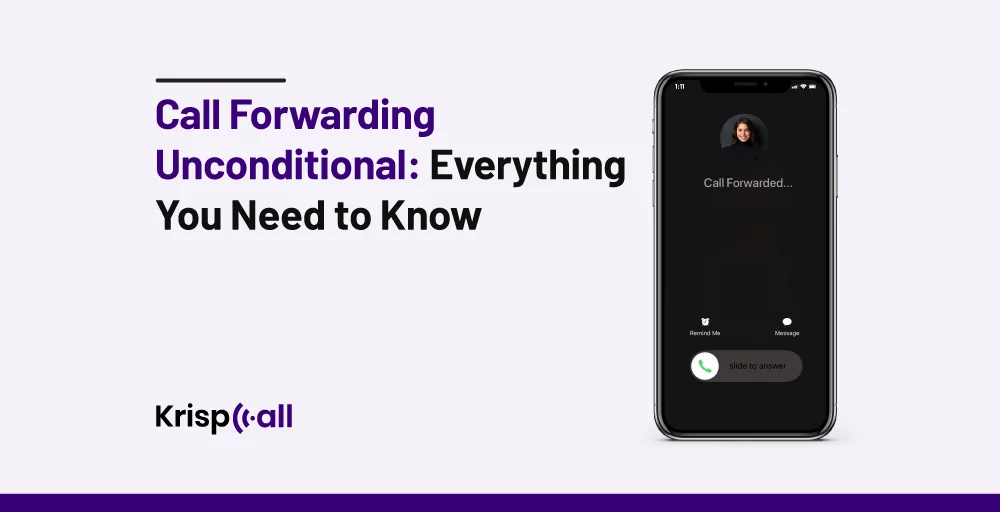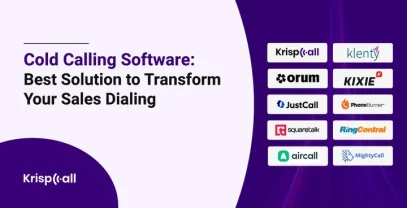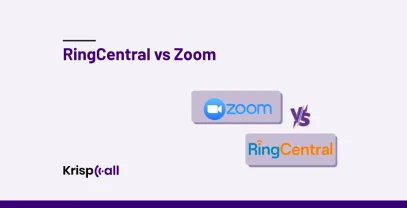Ever miss an important call because you forgot your phone at home or your clients calling you when you’re on vacation? 🤔 It happens to the best of us!
But don’t worry! There’s always a way to go. The solution is to use Call Forwarding Unconditional (CFU, a way to divert incoming calls to a number of your choice, so you can stay reachable even when your primary phone is out of reach.
In this blog, you will get to know everything you need to know about Call Forwarding Unconditional, how to activate it on Android/iOS, how to disable it, its benefits, and the best ways to use it. So, let’s get started. 💪
🔑KEY HIGHLIGHTS
- Call Forwarding Unconditional (CFU) is a call-handling feature that redirects all incoming calls to a designated number regardless of conditions.
- To activate CFU in Android, go to Phone > three dots on top-right corner > settings > call forwarding > toggle on the Always Forward button. For iPhone, go to Settings> Phone > Call Forwarding
- As a best practice for implementing Call Forwarding Unconditional, provide detailed guidance to recipients, regularly update settings, and set up voicemail on the forwarded number for efficient communication and responsiveness.
What does Call Forwarding Unconditional mean?
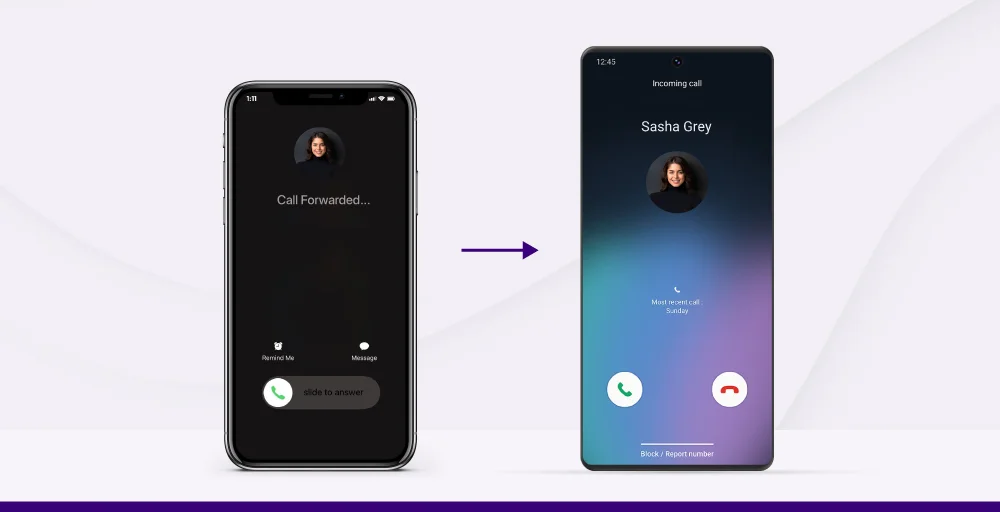
Call Forwarding Unconditional (CFU) is a telephony feature that redirects all your incoming phone calls to another destination number regardless of any forwarding conditions. This means when someone calls your phone number, it redirects the callee to another designated line bypassing the need of ringing your device.
In practical terms, let’s say you’re on vacation but don’t want to miss any urgent calls. With Call Forwarding Unconditional, you can direct all incoming calls to your trusted colleague, maintaining communication without disrupting your relaxation.
How does Unconditional Call Forwarding Work?
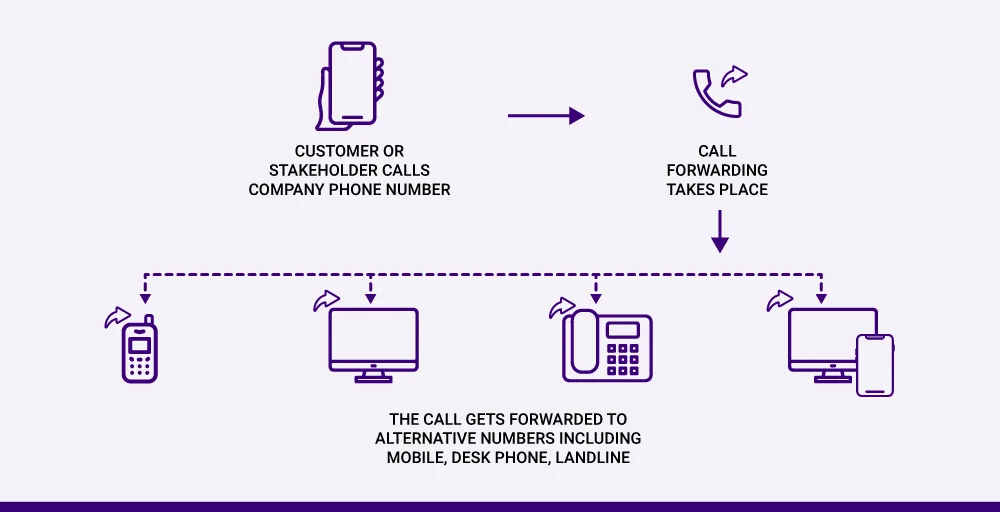
Unconditional Call Forwarding (CFU) is a convenient feature that essentially works as a call redirection service for your phone. Activation of CFU can be initiated either through your device’s settings menu or by utilizing a designated code provided by your carrier, facilitating a straightforward setup process.
The mechanism behind CFU is straightforward: when someone dials your number, the call is promptly rerouted to the forwarding number without triggering your phone to ring. This redirection occurs regardless of your phone’s operational state, whether it’s busy, unanswered, powered off, or out of network coverage.
How To Activate Call Forwarding Unconditional?
How to activate call forwarding unconditional on Android?
To activate call forwarding unconditional on Android, you have to follow these steps.
Step 1: Open your default “Phone” app
Step 2: Click on the three dots in the top right corner.
Step 3: Then go to “Setting” or “Call Setting”, depending on your Android.
Step 4: After that, look for the “Call Forwarding” option or “Supplementary Services”.
Step 5: Toggle on the “Always Forward” option.
How to turn on call forwarding unconditional on iPhone?
To turn on unconditional call forwarding on iPhone, simply follow these steps.
Step 1: Open the default Settings app on your iOS
Step 2: Scroll down or search for “Phone”
Step 3: Select “Call Forwarding”
Step 4: Toggle on the option
How to Deactivate Call Forwarding Unconditional?
Turning off the Call Forwarding unconditional is as simple as enabling it. You just have to follow simple steps.
How to deactivate call forwarding unconditional on android?
To disable the unconditional call forwarding feature on Android, here’s what you need to do.
Step 1: Go to your “Phone” app
Step 2: Tap on the vertical dotted icon on the top right corner
Step 3: Next, click on “settings” or “call settings”, depending on your Android.
Step 4: Click on “Call Forwarding” (It may be inside “Advanced Settings” or “Supplementary Services” in some Androids)
Step 5: Toggle off the “Always Forward” option
How to disable call forwarding unconditional on iPhone?
To stop the unconditional call forwarding setting on your iPhone, follow these steps.
Step 1: Launch the built-in “Settings” on your iPhone
Step 2: Find the “Phone” section
Step 3: Access the “Call forwarding” setting
Step 4: Deactivate it by toggling off the option
When to Use Call Forwarding Unconditional?
- You’re out of the office: If you’re out of the office for a business trip, vacation, or any other reason, you might want to use Call Forwarding Unconditional to ensure that incoming calls are directed to another number where someone else can handle them or where you can retrieve messages later. This ensures that important calls are not missed and that clients or colleagues can still reach someone who can assist them.
- You are on leave: When you are on leave, whether it’s for personal reasons or medical purposes, you may not be available to take calls. By activating Call Forwarding Unconditional, you can ensure that all of your calls are forwarded to another colleague or a designated point of contact who can address urgent matters or provide assistance in your absence.
- You are unable to answer the calls: Sometimes, you may be in a situation where you are unable to answer calls, such as during meetings, presentations, or other engagements where it would be inappropriate or disruptive to take a call. Call Forwarding Unconditional allows you to transfer phone calls to another number or voicemail where someone else can handle them until you’re available to respond.
- You are working remotely: When working remotely, especially if you’re in a different time zone or away from your primary workspace, you may not always be available to answer calls directed to your office phone or mobile device. In such cases, Call forwarding unconditional can redirect all your calls to your remote location or another number where you can be reached more easily, ensuring that communication remains seamless despite your physical location.
What are the benefits of Unconditional Call Forwarding?
- Reliable: Unconditional call forwarding ensures that incoming calls are reliably redirected to another number without depending on your phone’s status, ensuring you never miss important calls.
- Improved Availability: By forwarding calls unconditionally, individuals can maintain availability even when they’re unable to answer their primary phone, ensuring callers can reach them whenever necessary.
- Convenient: Unconditional call forwarding eliminates the need to manually forward calls each time, providing a hassle-free way to ensure calls are redirected seamlessly.
- Enhance Customer Service: Businesses can use unconditional call forwarding to ensure that customer calls are always answered promptly, improving customer satisfaction and overall service quality.
What are the drawbacks of Unconditional Call Forwarding?
- Extra Charges: Depending on your telecommunications plan, forwarding calls unconditionally may incur additional charges. These charges can add up, especially if you frequently forward calls to numbers outside your local area or country.
- Discomfort for Callers: Some callers may feel uncomfortable or frustrated when their calls are forwarded to another number or voicemail without reaching the intended recipient directly. This can lead to dissatisfaction with your communication process.
- Lack of Personal Connection: Call forwarding can sometimes lead to a lack of personal connection between callers and the intended recipient, especially if calls are consistently forwarded to voicemail instead of being answered directly by a person.
- Security Threat: Forwarding calls to an external number, especially if it’s not adequately secured, can pose a security threat. It increases the risk of unauthorized access to sensitive information or potential interception of calls.
Best Practices for Call Forwarding Unconditional
To optimize your use of call forwarding unconditional in the right manner, consider these best practices.
Provide detailed guidance to the forwarded call recipient
Ensure that the individual or service receiving forwarded calls understands the nature of the calls they might receive. Offer clear instructions on handling different types of inquiries or emergencies to maintain seamless communication with callers.
Regularly check for any updates in the settings
Timely review and update the settings for Call Forwarding Unconditional to reflect changes in your availability or contact information. This regular update helps to check that calls are consistently directed to the appropriate destination and that callers receive timely responses.
Set up voicemail on the number receiving forwarded calls
In case forwarded calls cannot be answered immediately, setting up voicemail ensures that callers can leave messages and receive a prompt response. Customize the voicemail greeting to provide callers with relevant information or alternative contact options, enhancing the caller experience and maintaining professional communication standards.
Utilize KrispCall’s call forwarding feature and never miss a connection with an important contact
Using cloud-based VoIP services such as KrispCall is one of the great and easy ways to utilize advanced call management features such as call forwarding, both unconditional and conditional.
With KrispCall’s 99.99% guaranteed uptime, excellent QoS, and call handling capabilities such as call forwarding, call routing, call transfer along CRM integrations, makes sure your business calls are never missed.
And the best part? All of these are in an affordable and customizable pricing starting at just $15/user/month along with 24/7 dedicated human support.
So, why wait? Book a demo with KrispCall now.
Conclusion
To wrap things up, call forwarding unconditional is a very efficient technique for handling your calls, when your regular phone number isn’t with you. By redirecting calls effortlessly, users can maintain their availability, enhance customer service, and stay connected even in the most challenging situations.
However, it’s essential to acknowledge the potential drawbacks and adopt best practices to maximize the utility of Call Forwarding Unconditional.
From providing clear guidance to recipients to regularly updating settings and leveraging advanced VoIP services, there are myriad ways to use unconditional call forwarding.
If you are looking to enhance your call management and unlock the full potential of Call forwarding Unconditional (CFU), then don’t forget to check out KrispCall.
As you know the right choices add up to the right tools to an effortless experience. Try KrispCall now, a feature-enrich Cloud-telephony with 99.99% guaranteed uptime.
FAQs
Is call forwarding unconditional bad?
Call forwarding unconditional itself is not inherently bad. It’s a feature provided by telecommunications companies that allows you to forward your incoming calls to another number without conditions. However, like any feature, it can be misused or exploited if configured improperly or without the user’s consent.
What is the difference between conditional and unconditional call forwarding?
The difference between conditional and unconditional call forwarding is that conditional call forwarding occurs under specific conditions, such as when your phone is busy, unreachable, or you don’t answer. Unconditional call forwarding, on the other hand, redirects all incoming calls regardless of your phone’s status.
Does call forwarding unconditional mean my phone is tapped?
No, call forwarding unconditional does not necessarily mean your phone is tapped. It is a standard feature provided by mobile carriers for user convenience. However, if you suspect unauthorized call forwarding or tapping, it’s essential to investigate and contact your service provider or relevant authorities.
What is Call forwarding unconditional voice not forwarded?
When you see “voice not forwarded” in the context of “call forwarding unconditional”, it indicates that the voice component of the call is not being forwarded. In other words, the call itself and its speech content are not transferred, which is typically done in a conventional call-forwarding situation.
When I dial *#21 it says call forwarding unconditional. What does this mean?
Dialing *#21# allows you to check the status of call forwarding on your phone. If it shows “call forwarding unconditional,” it means that all incoming calls are currently being unconditionally forwarded to another number. This could be intentional if you’ve set up call forwarding, or it could be activated without your knowledge, which might require investigation.

